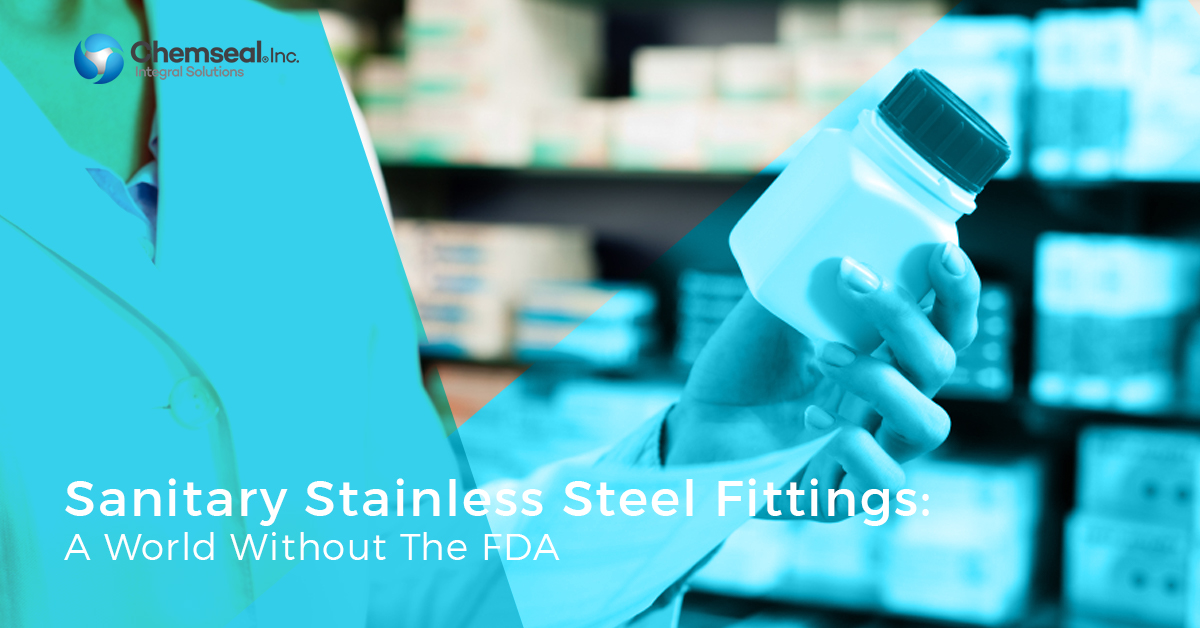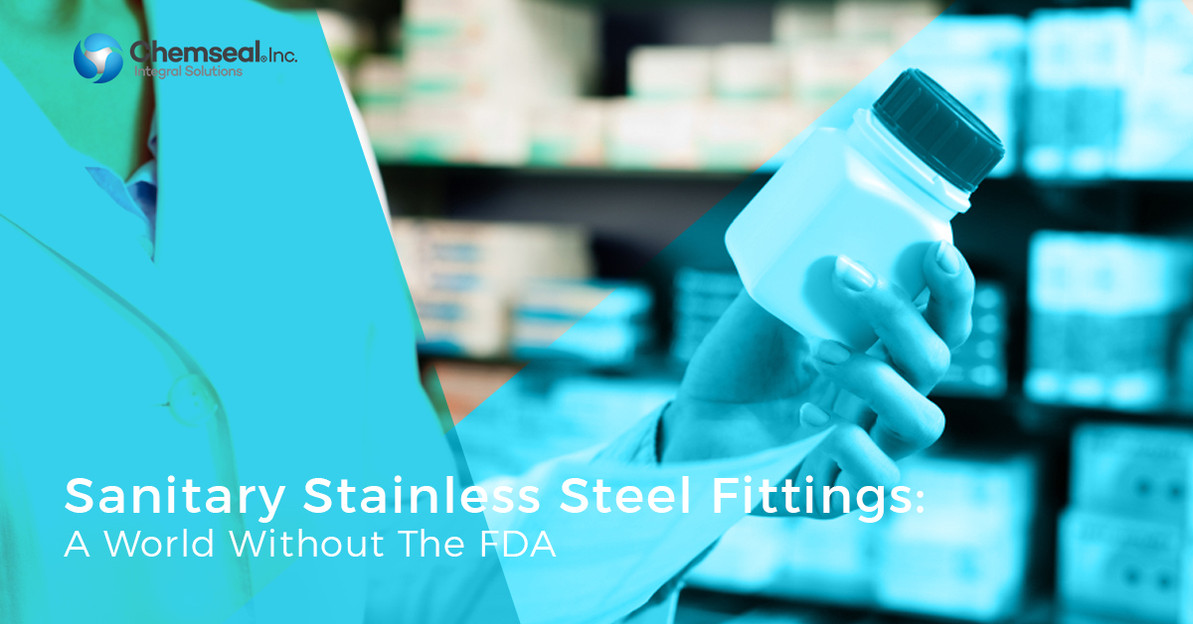 Oct 25th 2017
Oct 25th 2017 Sanitary Stainless Steel Fittings: A World Without The FDA

Should it really be up to a federal regulatory agency to help ensure that the things we eat, drink and consume are safe? Some disagree with the FDA while many firmly believe that it plays an important part in maintaining public health. Potential libertarian viewpoints aside, there’s no doubt that the FDA has played a great role in helping keep people safe, especially when it comes to consuming prescription drugs.
Our Hygienic Piping Design Keeps Things Safe
Well, at Chemseal, we’re quite familiar with these federal regulatory agencies like the FDA. Our sanitary stainless steel fittings provider commonly works in industries related to food production, beverage production, dairy production, pharmaceutical production, and biotech-related matters. This means that the high-quality stainless steel sanitary tubing and hygienic piping solutions we provide are constantly scrutinized by these regulatory oversights. It sounds like a pain and a constant source of stress for us, but it’s necessary and it makes sense having these organizations keeping us in check. Thanks to our hygienic piping design, these industries are able to make things that are safe for consumers, time and time again.
In another post about hypotheticals from your hygienic piping experts here at Chemseal, we’re going to take a closer look at the importance of regulatory agencies like the FDA and what things would be like without them.
A Force To Keep You Safe(r)
The point of the FDA is not necessarily to inform or even persuade us not to take a certain drug or consume something, but to legally stop us from doing these things. In the case of pharmaceuticals, the FDA carefully analyzes a company’s research data - a source of information that identifies a particular drug’s risks and benefits - and decides if the statistical probability that the drug will help you is worth the risk of unwanted side effects.
Again, people harbor their disagreements with the FDA for a number of reasons, one of which being: Why shouldn’t you be permitted to make a decision when it comes to consuming a pharmaceutical drug that could prove to be very beneficial? Your doctor may very well disagree with the FDA’s conclusions, as there is often disagreement among scientists and physicians within the FDA itself. In other words, you and your doctor may believe that, for your particular circumstances, an unapproved drug is actually worth the risk.
Living With The FDA
Despite these qualms within the drug testing sector, the FDA has kept millions upon millions of people alive and well in the United States and beyond throughout the years. Travel to a foreign country across the world and what you’ll find is that many places don’t have an equivalent to the Food and Drug Administration. If you’re traveling with some sort of significant ailment and you find that a prescription or over-the-counter drug is needed to help cope with your condition, the lack of regulatory oversight and education might be a little….unsettling.
After all, years of more or less risk-free drug consumption in the United States might leave you uneducated and unprepared for products on the shelves of different countries. It makes sense, what with growing up in a society where drugs that have legitimate impact and consequences are only available by prescription through an M.D., whereas the ones available over the counter are roughly as dangerous as the candy one aisle over.
Testing With No Prescriptions
With no regulatory oversight from the FDA and no prescriptions to determine that a specific drug is the right fit for someone’s condition, how would things be safe anymore? Involuntary and unintentional reactions to certain compounds would occur, and probably occur pretty frequently. How would drug companies even test their drugs in the first place if these tests were voluntary? It’s not likely that these drug companies’ profits would be enhanced or remotely benefited if their customers died from consuming their products, right? While they could still test their drugs before marketing and selling them, they probably wouldn’t test them nearly as thoroughly as the FDA requires them to do it.
Consumable Products Become Riskier
Not only would it be riskier to consume a given product, but the quality of said product might wildly vary. It’s difficult to say that any particular drug is completely ‘safe’ out there, but harm reduction and risk management practices are put in places by organizations like the FDA for good reason. Well, with no way of knowing one way or the other if something is safe to ingest, the only way to avoid bad things from happening is simply to not take anything.
Proving The Safety Of Products
Looking back on the FDA’s history, we’ve seen several worthwhile drugs designed to combat uncommon diseases never make it to market simply because the cost of proving their safety and effectiveness wasn’t worth it. It’s an ethical dilemma when it comes to drug approval with the FDA - certain drugs are worth the risk of consumption due to their benefits, but while waiting for FDA approval, people are dying or suffering. So, without the FDA and other relevant regulatory organizations, not only would there be a lot more choice in the medicine marketplace, but many people could receive effective treatment without waiting and ultimately deteriorating in their condition.
Again, is the risk worth it? We’ll end it here as a matter of food for thought.
Ensuring Safe Products Through Hygienic Piping
Chemseal products are proud to support the manufacturing of safe food, beverage, dairy and drug products, and we’re happy to be overseen by regulatory agencies like the FDA. Learn more about the importance of hygienic piping design and shop our sanitary stainless steel pipes and hygienic fittings here!
 Oct 25th 2017
Oct 25th 2017 Recent Posts
-
Nov 7th 2022
What Is Food-Grade Stainless Steel Tubing?
Businesses that produce food and beverage products must operate hygienically. Sterile environments a …Nov 7th 2022
-
Oct 11th 2022
Why Sanitary Fittings Are Important for the Medical Industry
Sanitary fittings are useful for many industries. Food and beverage manufacturers have used these to …Oct 11th 2022
-
Sep 23rd 2022
What Is the Max Operating Temperature for Stainless Steel?
Stainless steel is valued in many industrial applications because it’s capable of withstanding high …Sep 23rd 2022





